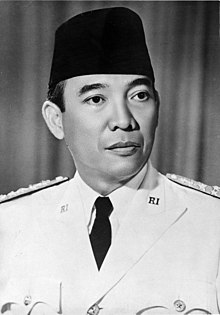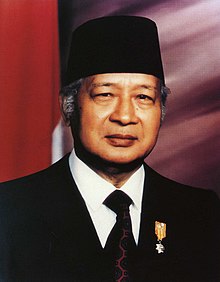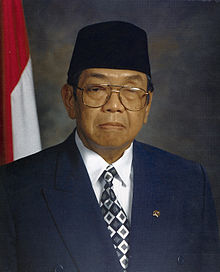Presidents of Indonesia
Presidents of Indonesia
1. Sukarno
 Sukarno (born Kusno Sosrodihardjo; Javanese: ꦯꦸꦏꦂꦤ; 6 June 1901 – 21 June 1970)[2]was the first President of Indonesia, serving in office from 1945 to 1967.
Sukarno (born Kusno Sosrodihardjo; Javanese: ꦯꦸꦏꦂꦤ; 6 June 1901 – 21 June 1970)[2]was the first President of Indonesia, serving in office from 1945 to 1967.
Sukarno was the leader of his country's struggle for Independence from the Netherlands. He was a prominent leader of Indonesia's nationalist movement during the Dutch colonial period, and spent over a decade under Dutch detention until released by the invading Japanese forces. Sukarno and his fellow nationalists collaborated to garner support for the Japanese war effort from the population, in exchange for Japanese aid in spreading nationalist ideas. Upon Japanese surrender, Sukarno and Mohammad Hatta declared Indonesian independence on 17 August 1945, and Sukarno was appointed as first president. He led Indonesians in resisting Dutch re-colonization efforts via diplomatic and military means until the Dutch acknowledgement of Indonesian independence in 1949. Author Pramoedya Ananta Toer once wrote "Sukarno was the only Asian leader of the modern era able to unify people of such differing ethnic, cultural and religious backgrounds without shedding a drop of blood."[3]
After a chaotic period of parliamentary democracy, Sukarno established an autocratic system called "Guided Democracy" in 1957 that successfully ended the instability and rebellions which were threatening the survival of the diverse and fractious country. The early 1960s saw Sukarno veering Indonesia to the left by providing support and protection to the Indonesian Communist Party (PKI) to the irritation of the military and Islamists. He also embarked on a series of aggressive foreign policies under the rubric of anti-imperialism, with aid from the Soviet Union and China. The 30 September Movement (1965) led to the destruction of the PKI and his replacement in 1967 by one of his generals, Suharto (see Transition to the New Order), and he remained under house arrest until his death.
2. Suharto
General of the Army Hajji Suharto (also spelled Soeharto;  pronunciation (help·info), or Muhammad Soeharto; Javanese : ꦩꦸꦲꦩ꧀ꦩꦢ꧀ꦯꦸꦲꦂꦠ ; 8 June 1921 – 27 January 2008) was the second President of Indonesia, holding the office for 31 years from the ousting of Sukarno in 1967 until his resignation in 1998.
pronunciation (help·info), or Muhammad Soeharto; Javanese : ꦩꦸꦲꦩ꧀ꦩꦢ꧀ꦯꦸꦲꦂꦠ ; 8 June 1921 – 27 January 2008) was the second President of Indonesia, holding the office for 31 years from the ousting of Sukarno in 1967 until his resignation in 1998.
 Suharto was born in a small village, Kemusuk, in the Godean area near the city of Yogyakarta, during the Dutch colonial era.[2] He grew up in humble circumstances.[3] His Javanese Muslim parents divorced not long after his birth, and he was passed between foster parents for much of his childhood. During the Japanese occupation of Indonesia, Suharto served in Japanese-organised Indonesian security forces. Indonesia's independence struggle saw his joining the newly formed Indonesian army. Suharto rose to the rank of major general following Indonesian independence. An attempted coup on 30 September 1965 allegedly backed by the Indonesian Communist Party was countered by Suharto-led troops.[4] The army subsequently led an anti-communist purge which the CIAdescribed as "one of the worst mass murders of the 20th century"[5] and Suharto wrested power from Indonesia's founding president, Sukarno. He was appointed acting president in 1967, replacing Sukarno, and elected President the following year. He then mounted a social campaign known as De-Soekarnoization in an effort to reduce the former President's influence. Support for Suharto's presidency was strong throughout the 1970s and 1980s. By the 1990s, the New Order's authoritarianism and widespread corruption[6] were a source of discontent and, following a severe financial crisis, led to widespread unrest and his resignation in May 1998. Suharto died in 2008 and was given a state funeral.
Suharto was born in a small village, Kemusuk, in the Godean area near the city of Yogyakarta, during the Dutch colonial era.[2] He grew up in humble circumstances.[3] His Javanese Muslim parents divorced not long after his birth, and he was passed between foster parents for much of his childhood. During the Japanese occupation of Indonesia, Suharto served in Japanese-organised Indonesian security forces. Indonesia's independence struggle saw his joining the newly formed Indonesian army. Suharto rose to the rank of major general following Indonesian independence. An attempted coup on 30 September 1965 allegedly backed by the Indonesian Communist Party was countered by Suharto-led troops.[4] The army subsequently led an anti-communist purge which the CIAdescribed as "one of the worst mass murders of the 20th century"[5] and Suharto wrested power from Indonesia's founding president, Sukarno. He was appointed acting president in 1967, replacing Sukarno, and elected President the following year. He then mounted a social campaign known as De-Soekarnoization in an effort to reduce the former President's influence. Support for Suharto's presidency was strong throughout the 1970s and 1980s. By the 1990s, the New Order's authoritarianism and widespread corruption[6] were a source of discontent and, following a severe financial crisis, led to widespread unrest and his resignation in May 1998. Suharto died in 2008 and was given a state funeral.
The legacy of Suharto's 31-year rule is debated both in Indonesia and abroad. Under his "New Order" administration, Suharto constructed a strong, centralised and military-dominated government. An ability to maintain stability over a sprawling and diverse Indonesia and an avowedly anti-Communist stance won him the economic and diplomatic support of the West during the Cold War. For most of his presidency, Indonesia experienced significant economic growth and industrialisation,[7] dramatically improving health, education and living standards.[8]
Plans to bestow Suharto with a National Hero title are currently being considered by the Indonesian government and has been highly debated in Indonesia.[9] According to Transparency International, Suharto is the most corrupt leader in modern history, having embezzled an alleged $15–35 billion during his rule.[10]
3. Bacharuddin Jusuf Habibie
Bacharuddin Jusuf Habibie( pronunciation (help·info); born 25 June 1936) is an Indonesian engineer who was President of Indonesia from 1998 to 1999. He succeeded Suharto, who resigned in 1998. His presidency is seen as a transition to the post-Suharto era. Upon becoming president, he liberalized Indonesia's press and political party laws, and held an early democratic election in 1999, which resulted in the end of his presidency. His presidency was the third, and the shortest, after independence.
pronunciation (help·info); born 25 June 1936) is an Indonesian engineer who was President of Indonesia from 1998 to 1999. He succeeded Suharto, who resigned in 1998. His presidency is seen as a transition to the post-Suharto era. Upon becoming president, he liberalized Indonesia's press and political party laws, and held an early democratic election in 1999, which resulted in the end of his presidency. His presidency was the third, and the shortest, after independence.
4.Abdurrahman Wahid
Abdurrahman Wahid, born Abdurrahman ad-Dakhil[2][3] (/əbduːˈræxmən wəˈhiːd/ ( listen)əb-doo-RAKH-mən wə-HEED; 7 September 1940 – 30 December 2009), colloquially known as
listen)əb-doo-RAKH-mən wə-HEED; 7 September 1940 – 30 December 2009), colloquially known as  Gus Dur (help·info), was an Indonesian Muslim religious and political leader who served as the President of Indonesia from 1999 to 2001. The long-time president of the Nahdlatul Ulama and the founder of the National Awakening Party (PKB), Wahid was the first elected president of Indonesia after the resignation of Suharto in 1998.
Gus Dur (help·info), was an Indonesian Muslim religious and political leader who served as the President of Indonesia from 1999 to 2001. The long-time president of the Nahdlatul Ulama and the founder of the National Awakening Party (PKB), Wahid was the first elected president of Indonesia after the resignation of Suharto in 1998.
His popular nickname Gus Dur, is derived from Gus, a common honorific for a son of kyai, from short-form of bagus ('handsome lad' in Javanese language[4]); and Dur, short-form of his name, Abdurrahman.
5.Megawati Sukarnoputri
Diah Permata Megawati Setiawati Sukarnoputri,[1] usually shortened to Megawati Sukarnoputri ( pronunciation (help·info) born 23 January 1947), generally known as Megawati, is an Indonesian politician who served as president of Indonesia from 23 July 2001 to 20 October 2004.
pronunciation (help·info) born 23 January 1947), generally known as Megawati, is an Indonesian politician who served as president of Indonesia from 23 July 2001 to 20 October 2004.
Megawati is the leader of the Indonesian Democratic Party of Struggle (PDI-P), one of Indonesia's largest political parties. She is the daughter of Indonesia's first president, Sukarno.
Megawati has been Indonesia's only female president and the sixth woman to lead a Muslim-majority country. She is also the first Indonesian leader to be born after Indonesia proclaimed independence. After serving as vice-president to Abdurrahman Wahid, Megawati became president when Wahid was removed from office in 2001. She ran for re-election in the 2004 presidential election, but was defeated by Susilo Bambang Yudhoyono. She sought a rematch in the 2009 presidential election, losing again to Yudhoyono.
6. Susilo Bambang Yudhoyono
Susilo Bambang Yudhoyono GCB AC DUT (First Class) (Javanese: ꦯꦸꦱꦶꦭꦨꦩ꧀ꦧꦁꦪꦸꦝꦪꦤ;[1]Gêdrìk: Susilå Bambang Yudhåyånå; O-Javanese: Susilo Bambang Yudhoyono; born 9 September 1949) (pronounced [susiɭɔ b̥amb̥aŋ juɖ̥ɔjɔnɔ] ( listen)) is an Indonesian politician and retired Army general officer who was the President of Indonesia from 2004 to 2014. He is currently the chairman of the Democratic Party of Indonesia and President of the Assembly and Chair of the Council of the Global Green Growth Institute.
listen)) is an Indonesian politician and retired Army general officer who was the President of Indonesia from 2004 to 2014. He is currently the chairman of the Democratic Party of Indonesia and President of the Assembly and Chair of the Council of the Global Green Growth Institute.
Yudhoyono won the 2004 presidential election, defeating incumbent President Megawati Sukarnoputri. Widely known in Indonesia by his initials "SBY", he was sworn into office on 20 October 2004, together with Jusuf Kalla as Vice-President. He ran for re-election in 2009with Boediono as his running mate, and won with an outright majority of the votes in the first round of balloting; he was sworn in for a second term on 21 October 2009.
7. Joko Widodo
 Joko Widodo(born 21 June 1961), also known as Jokowi, is the seventh and current President of Indonesia, in office since 2014. Previously he was Mayor of Surakarta from 2005 to 2012 and Governor of Jakarta from 2012 to 2014. He is the first Indonesian president without a high-ranking political or military background.[1]
Joko Widodo(born 21 June 1961), also known as Jokowi, is the seventh and current President of Indonesia, in office since 2014. Previously he was Mayor of Surakarta from 2005 to 2012 and Governor of Jakarta from 2012 to 2014. He is the first Indonesian president without a high-ranking political or military background.[1]
Jokowi was nominated by his party, the Indonesian Democratic Party of Struggle (PDI-P), to run in the 2012 Jakarta gubernatorial election with Basuki Tjahaja Purnama (often known as Ahok)[2] as his running mate.[3] Jokowi was elected as Governor of Jakarta on 20 September 2012 after a second round runoff election in which he defeated the incumbent governor Fauzi Bowo.[4] During his governorship, his characteristic blusukan habit[5] and highly-publicized field visits increased his popularity across the country.[6]
His nomination as PDI-P candidate for the 2014 presidential election was announced on 14 March 2014.[7] The presidential election was held on 9 July 2014. After some controversy about the result of the election, Jokowi was named as president-elect on 22 July. He was formally declared as the winner of the election by the General Elections Commission(Komisi Pemilihan Umum or KPU), winning 53.1% of the vote, the closest in Indonesian history,[8] over his opponent Prabowo Subianto who disputed the outcome and withdrew from the race before the count was completed.[9]
As president, Jokowi's domestic policy has focused on infrastructure development across the archipelago in accordance to a "Global Maritime Axis" policy,[10] following cuts in fuel subsidies and a tax amnesty program.[11][12] On foreign affairs, his administration has placed an emphasis on "protecting Indonesia’s sovereignty",[13] with the sinking of illegal foreign fishing vessels[14] and prescription of capital punishment for drug smugglers, despite foreign criticisms.[15][16]
Reference:
Wikipedia






Comments
Post a Comment